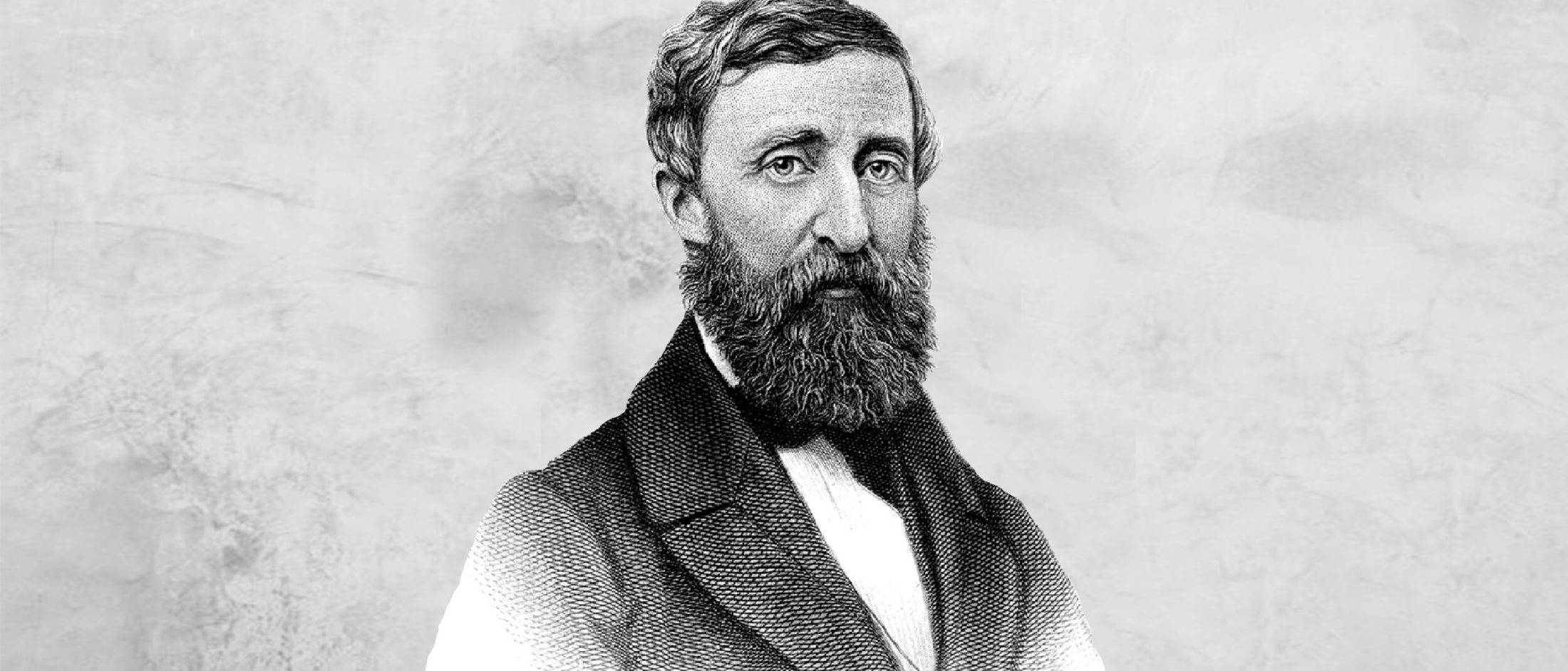
A tax evader, rebel philosopher and the grandfather of environmentalism, Henry Thoreau (1817—1862) practiced a back-to-nature experience of the natural world while opposing authority.
Though enjoying no great acclaim in his lifetime, today the name Henry David Thoreau resonates across philosophy, literature, political history, natural history and environmental science. His spirit of non-conformity, his rugged individualism and his ‘essentialist’ approach to living, have seen him mythologised as an American hero – and an ancestor of various ‘return to nature’ movements, too.
The son of a pencil maker, Thoreau was born in 1817 in Massachusetts, US. He demonstrated free minded dissent for institutions early in life. While at Harvard, he allegedly refused to pay for his diploma certificate. In his subsequent role as teacher, he rejected a recommendation for corporal punishment – by thrashing a random group of students to make a point, then resigning. Later, he would refuse to pay six years’ taxes. He saw it as surrendering his money to fund slavery and the government’s war in Mexico, both of which he vigorously opposed. For this, he was thrown in jail.
Civil Disobedience
Thoreau’s spirit of resistance coalesced in the libertarian manifesto Civil Disobedience. Unjust governments have no right bending citizens to their arbitrary laws and corrupt systems, he argued in the book. A free, enlightened state was only possible once that state “recognised the individual as a higher and independent power”, and enabled them to be “men first, and subject after”.
Rather than meekly obey, Thoreau said he was obliged “to do at any time what I think right” – even if that meant breaking the law. This idea of self-governance by individual conscience would later inspire Gandhi, Martin Luther King and others who took a principled stance against unjust rule.
It has also been widely critiqued. Violent and bigoted acts can, after all, easily be committed under the banner of self-righteousness. And what if two people divided on a matter by ideology or faith can’t settle their differences?
Lines in Civil Disobedience like, “That government is best which governs not at all” also make some question whether Thoreau’s libertarian politics tended towards anarchism.
Simple living, transcendentalism and the Walden experiment
A fellow resident of his home town, Ralph Waldo Emerson was a pivotal influence on Thoreau. He introduced Thoreau to transcendentalism – a movement which reacted against religious and intellectual trends, and enjoined each individual to forge their own “original relation to the universe”. Thoreau became a key figure in the movement. For him, solitude, simplicity, awareness and harmonious engagement with the wild were concrete ways to forge this relation. His philosophy as well as his science, insisted upon embodied understanding, rather than just a contemplative or discursive one.
In a forest cabin lent to him by Emerson, Thoreau conducted an experiment in simple living which would last two years and two months. His methods and reflections during this time became the classic work Walden – named after a pond which abutted the property. In it, with poetic eloquence, didacticism and free wheeling style, he lays out his view of a resigned, frivolous and wretched humanity, and how one is to instead rise above and “live deliberately”.
To achieve an existence which is pure and meaningful, Thoreau argued a life must be cultivated free from illusion and excess. He practiced a style of subsistence living through radical self-denial. Only essential needs were identified and met. A plausible misanthrope, he forswore conversation, sensuality, coffee, meat and alcohol, advising just one meal a day. To relinquish to the slightest temptation was to open the gates to moral disrepair. He even eschewed a doormat, “preferring to wipe my feet on the sod before my door.”
According to the American author John Updike, “Waldenhas become such a totem of the back-to-nature, preservationist, anti-business, civil-disobedience mindset, and Thoreau so vivid a protester, so perfect a crank and hermit saint, that the book risks being as revered and unread as the Bible”.
Kathryn Schulz reads Thoreau’s hermitage as rather a renunciation of responsibility, and categorises it as “original cabin porn”.
“Being forever on the alert”
Shorn of distractions, purged of indulgences, Thoreau believed a greater awareness of the universe can bloom. But more vital to his philosophy was an “ethics of perception” – requiring rigorous attentiveness to the outside world as it was uniquely registered on the senses. This could be observing a sunset’s reflection on glass, or the miniaturised battle of ants. Through this expanded and intensified focus, man was empowered to elevate his life, in “infinite expectation of the dawn”.
A surveyor by trade, Thoreau said we must consciously endeavour to practice “the discipline of looking […] at what is to be seen”.He was suspicious of orthodox forms of knowledge and believed the “essential facts of life” come to us through “the perpetual instilling and drenching of the reality that surrounds us”. Truth, then, was deeply individualised communion between self and world, and the product of intuition and revelation, rather than logic or reason.
Natural as intrinsically valuable
Thoreau’s ideas around nature’s intrinsic value have had significant bearing on modern conservationism. The sublime beauty and order that could be perceived in natural phenomena were not, he thought, qualities projected onto it by humans. They were immanent. What’s more, “Whatever we have perceived to be in the slightest degree beautiful is of infinitely more value to us than what we have only as yet discovered to be useful and to serve our purpose”.
In other words, nature cannot be commodified. Priceless, it must be viewed on its own terms, rather than as a resource to serve human agendas and needs. His view was diametrically opposed to the anthropocentricism that characterised the industrial revolution’s frenzied assault upon lands and oceans, which would culminate in the raft of ecological crises facing us today.
Thoreau also drew attention to the hidden benefits and invisible services of plant and animal species. In one example, he considered the squirrel. To the average American, they were a pest. But if we recognised squirrels in a broader ecosystem context, we could honour them as “planters of forests”, noble little workers whose free labour humans couldn’t do without.
Thoreau recognised, too, that our ignorance of these hidden benefits makes us careless. Trampling over nature’s bounty, upending its fragile balance, we are liable to do untold damage – for which we may ourselves pay a dear cost. In this sense, he was prescient.
“I should be glad if all the meadows on the earth were left in a wild state,” he wrote, “if that were the consequence of men’s beginning to redeem themselves.”
Ethics in your inbox.
Get the latest inspiration, intelligence, events & more.
By signing up you agree to our privacy policy
You might be interested in…
Opinion + Analysis
Climate + Environment
Why it was wrong to kill Harambe
Opinion + Analysis
Climate + Environment, Politics + Human Rights
Australia, it’s time to curb immigration
Opinion + Analysis
Climate + Environment, Politics + Human Rights, Relationships
This is what comes after climate grief
Opinion + Analysis
Climate + Environment, Health + Wellbeing, Society + Culture




